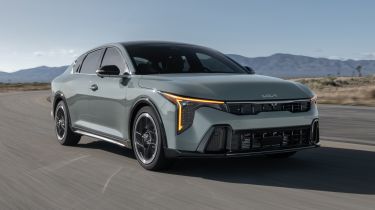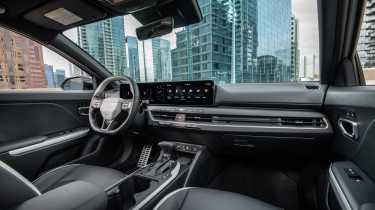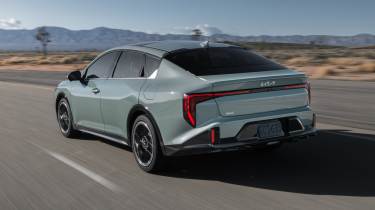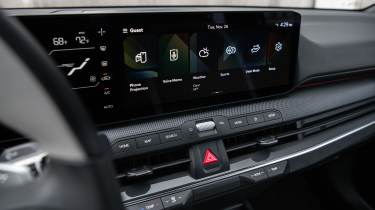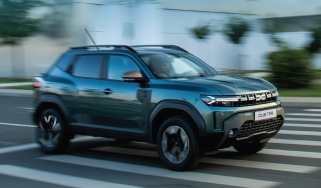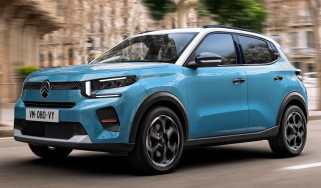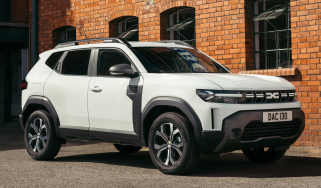New Kia Ceed K4 GT-Line Turbo 2025 review: family hatch is bigger and bolder than ever
The Kia K4 will eventually become the new Ceed in the UK, and it’s taking a big step upmarket

Verdict
The Kia K4 feels like a big step on from the Ceed it’s likely to replace – literally so in terms of exterior dimensions. This is a larger, more premium machine, which really impressed us during our first encounter in the US. It’s another modern and distinctive Kia design delight, and the interior feels thoroughly contemporary; rear-seat passengers will love the abundance of legroom, too. Mature and sophisticated to drive, we look forward to trying the European car that’s due later this year.
Kia is on a roll in the UK. Last year, it set another record for sales, and overtook both Ford and Toyota to become Britain’s fourth best-selling car brand. The Kia Sportage was the nation’s second best-selling SUV, the multi-powertrain Niro family continues to thrive, and the new Kia EV3 looks set to repeat the success of the EV6 and EV9.
Another factor in Kia’s 2024 success was the Ceed,, which accounted for a 13 per cent share of last year’s sales. That’s despite the Ceed getting on a bit, too: the current version was launched in 2018 and facelifted in 2021, meaning the next generation is long overdue. Thankfully, while we’ve already spied the Ceed’s replacement undergoing evaluation, we’ve also driven the car believed to be hiding under the covers: the K4.
Used - available now
Unlike today’s EU-specific Ceed, the K4 is a global car that was launched at the 2024 New York Auto Show. The model is already on sale in its home market of South Korea, as well as in the US – so we travelled to California to drive it, in range-topping GT-Line trim with the range-topping 1.6-litre turbo engine.
The K4 is available in two bodystyles. We drove the saloon, but it seems likely Europe will get the five-door hatchback version instead. Both are identical from the front, and even the rear doors share the same ‘hidden’ handles. The hatchback trades the saloon’s sleek roofline for a cool-looking shooting brake-style rear.
If you like the bold looks of the EV3 and EV9, you’ll love the K4. At the front, it has the same vertically orientated headlights with inset LED running lights; they’re yellow on US-spec models but will be white for UK cars. The vertical tail-lamps, in deep red and connected by a light bar, are also eye-catching.
It’s a sleek design with clean, modern lines. Compared with the Ceed, it’s longer, smoother and more sophisticated. It has less of a cab-forward silhouette, the curvaceous rear haunches are powerful and the vertical D-pillar is distinctive. It shows off Kia’s ‘Opposites United’ design language really well. As mentioned, we drove a GT-Line model, which is always a popular trim in the UK; this has extra sporty styling details, including cool cube-shaped LED projector headlights.
The K4 is based on Hyundai-Kia’s K3 platform. This also underpins the latest Kia Niro and Hyundai Kona – along with, in electrified form, the EV3. It’s larger than the K2 platform in the current Ceed, with benefits including a lower centre of gravity and improved safety.
At 4,709mm long, the K4 saloon is nearly 400mm longer than the existing Ceed. It’s as lengthy as a BMW 3 Series and, at 1,850mm, wider than that car, too. The hatch will have a shorter, more squared-off rear end, but a more usable boot..
Rear-seat space is already pretty good in the outgoing Ceed, but it’s even better in the K4. The wheelbase is a healthy 70mm longer, which gives very generous leg and knee room – indeed, Kia claims it’s class-leading. A bit more foot room under the front seats would be nice, though, and the saloon’s sleek roofline – at 1,420mm tall, it’s actually 27mm lower than the Ceed – might limit headroom for taller adults. The high-backed front seats restrict forward vision a little, too.
You get a low-slung feel behind the wheel, which is backed up by a modern, open-plan dashboard. The layout is dominated by an infotainment display that stretches nearly 30 inches across. It comprises a 12.3-inch instrument cluster, a 12.3-inch touchscreen (incorporating the Kia Connect ‘hey Kia’ voice assistant) and a five-inch climate display in between. It looks great, although the far reaches of the touchscreen are a bit of a stretch and, as in the EV3, the steering wheel conceals the climate-control display.
This doesn’t matter, because Kia has retained physical toggles for the climate control. They sit below another array of shortcut buttons and a rotary volume dial. There are proper buttons on the steering wheel, which helps make it much easier to use. Heated and ventilated seat controls are located above the door handle; overall, Kia has got the balance between physical and digital operation spot-on. The offset Kia logo on the steering wheel is a nice touch, too.
Stowage space is good, with a broad centre armrest sitting behind two US-sized cup-holders. There’s another large cubby ahead of the T-shaped gearlever, which incorporates a wireless charging pad complete with grips to hold your phone in place.
As with all new Kias, the interior is nicely finished, with some interesting contrasting colour schemes.
In the US, the Kia K4 is available with just two engines. There’s a 147bhp 2.0-litre four-cylinder, which is paired with a CVT gearbox that Kia calls an ‘intelligently variable transmission’. With just 179Nm of torque at 4,500rpm, it’s likely to be a noisy, hard-worked engine.
We drove the alternative range-topping engine, a 190bhp 1.6-litre turbo that may be offered in Europe, along with other smaller petrol motors and perhaps even the Niro’s hybrid choices. Fortunately, instead of the CVT, it has a traditional eight-speed automatic gearbox, complete with steering-wheel paddleshifters.
With 265Nm of torque, the turbo engine pulls well on the road. It accelerates from 0-62mph in around 7.5 seconds, and the smooth, rorty engine note sounds sporty under acceleration – even if it’s a bit too audible at higher revs. It does manage to settle down when cruising, though.
There are several drive modes, controlled by a button on the bottom spoke of the steering wheel. The smooth-shifting gearbox changes up early in the Eco and Normal modes to save fuel, while Sport holds onto the gears and makes it feel more dynamic. The steering, which is responsive and has good on-centre precision, weights up, too.
In the US, regular K4 models have a torsion-beam rear suspension set-up, but GT-Line versions have a more sophisticated multi-link design. On the thrilling twists and turns of the Angeles Crest Highway, the K4 acquitted itself well, with plenty of grip and agility. It remained composed and stable even on badly broken and challenging surfaces, and resisted understeer well.
GT-Line models also have 18-inch wheels, but they didn’t seem to impact urban ride quality, where the K4 felt smooth and refined. It was a bit busier at higher speeds, and the tyres could be heard pattering across the sun-baked tarmac, but it nevertheless felt settled, comfortable and mature. Wind noise was kept at bay, too.
Kia hasn’t disclosed the hatch’s boot capacity, but it is expected to be generous. The saloon has a wide, practical space, albeit naturally restricted by the traditionally small boot opening.
There are not any European WLTP fuel economy figures yet, but on the strict US EPA test, the K4 turbo averages around 35mpg. Following a very spirited drive into the mountains, we saw 30mpg on the trip computer. Expect around 45mpg on the WLTP test.
In terms of prices, the K4 is a larger and more upscale car than the Ceed it looks set to replace. Ceed prices currently start from £23,105, but we reckon the K4 could kick off from around £27,000 – similar to an entry-level Volkswagen Golf and still a bit cheaper than a Peugeot 308.
Expect the K4 to be well equipped as standard, with features including wireless Apple CarPlay and Android Auto, plus all-round LED lighting. Higher grades will have premium features such as Harman Kardon audio, ventilated front seats and Kia’s clever blind spot camera monitor, which appears in the driver display when you indicate.
| Model: | Kia K4 GT-Line Turbo |
| Price: | £27,000 (est) |
| On sale: | Late 2025 |
| Powertrain: | 1.6-litre 4cyl turbo petrol |
| Power/torque: | 190bhp/265Nm |
| Transmission: | Eight-speed auto, front-wheel drive |
| 0-62mph/top speed: | 7.5 seconds (est) |
| Economy: | TBC |
| CO2: | TBC |
